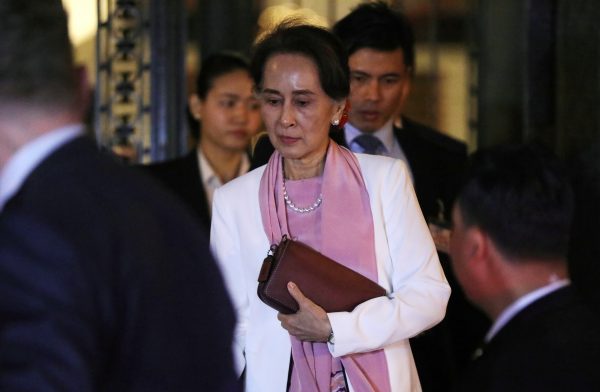The NLD’s most important party organ is its 21-member Central Executive Committee (CEC). It is led by Chairperson Aung San Suu Kyi (Myanmar’s State Counsellor), Vice Chairman Win Myint (Myanmar’s President) and a second Vice Chairman Zaw Myint Maung (Chief Minister of the Mandalay Region). Many CEC members are also part of the NLD’s legislative and executive branches, resulting in an overlap between the party’s central office and the party in public office.
Myanmar’s constitution mandates that members of the union level executive refrain from engaging in party business. But the party’s highest executives in public office can influence party business through the state and region ministers. Indeed, the party’s highest executives in public office — most importantly Aung San Suu Kyi — are calling the shots.
But the true source of power still lies within the CEC. Zaw Myint Maung explained that ‘both the parliament and the government are below the party. I am in this position because the party assigned me in this way. Who assigned me? The party. So, the party is above all of us. Below the party is the parliament. Below the party is the government’.
The NLD is characterised by low levels of regulation and provisions that allow the sidestepping of democratic processes. The National Convention of the League — the NLD’s party congress — in theory elects the 120-member Central Committee (CC), which in turn elects the CEC members. In 2013 the NLD followed procedure and elected 120 members to the CC. But in 2018 the party decided that it was easier to simply fill vacant CC seats without election.
The party also has no regulations on term limits. As long as you stay alive and are not expelled from the party you can technically remain a CC member indefinitely. This lack of proper procedure matters because the CC has the ability to change the party’s constitution and elect CEC members.
When 15 CEC positions had to be filled in 2013, the candidates for seven of the 15 positions were suggested directly by Aung San Suu Kyi and promptly confirmed by the CC. Since then, the party has not elected a single CEC member, opting for a top-down appointment process instead.
Even in the cases where indicators for procedures exist, there is a corresponding back door that provides the opportunity to evade the process. For example, the constitution of the NLD notes that all its structural elements should be elected democratically. Yet it adds that ‘although the elements of this hierarchy must be elected democratically in principle, if required by the circumstances, they shall be formed through democratic negotiation’.
The NLD’s extremely short party constitution has not changed significantly since its foundation and already favours its central party organs. The absence of further regulation adds to the power of these organs — effectively creating a deeply centralised political party without proper democratic procedures.
The rationale for party’s organisational makeup and its institutional setup are explained by its history. The NLD suffered from decades of state-sponsored oppression that made meaningful institutionalisation virtually impossible. For a long time, the party simply did not have the freedom to operate in democratic ways. But it is disconcerting that the party is not undertaking greater steps towards party institutionalisation and better internal democratic procedures since its transition to power.
It is generally expected that the central office of a party becomes less powerful when the party’s domain in public office grows larger. But the NLD has escaped this dynamic because it believes that a powerful centralised party office will provide the most effective control of the wider party. Yet commitment to control and centralisation instead of democratic practices can have detrimental effects. The management of a party based on top-down decisions alone robs the organisation of the opportunity to build programmatic political cohesion based on internal debates and discourse over best practices.
The party’s failure to build a proper constitution that would allow for further institutionalisation of the party leads its supporters to identify with its leader Aung San Suu Kyi, rather than with a party identity or program. When Aung San Suu Kyi is no longer able to perform her duties this will likely result in the split of the party into multiple personalistic factions since its officials are ultimately disunited on political issues beyond the shared goal of the retrenchment of military influence.
The party’s politicians are also socialised under authoritarian decision-making modes rather than democratic procedures. This might very well form a new generation of NLD leaders who have little concern for democratic practices.
Richard Roewer is a DPhil student at the Department of Politics and International Relations, The University of Oxford, and a PhD student at the Institute of Asian Studies at the German Institute of Global and Area Studies (GIGA), Hamburg.
This article is drawn from the author’s recent publication ‘Three Faces of Party Organisation in the National League for Democracy’ in the Journal of Current Southeast Asian Affairs.

